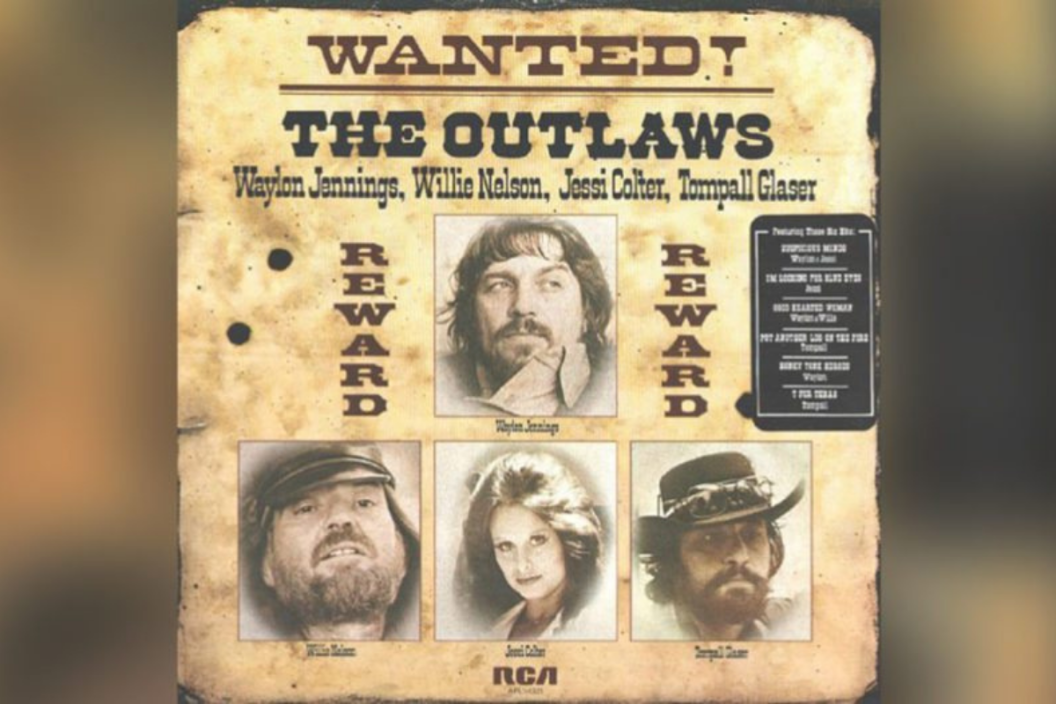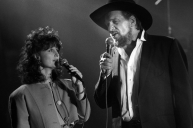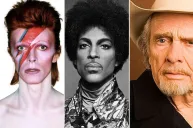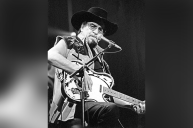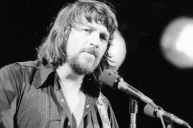Would you believe that country music didn't have its first platinum album until 1976? Hard to fathom, but it took decades to sell one million copies of any country music record. And that record — Wanted! The Outlaws— spawned a revolutionary new subgenre, "outlaw country." It was the first country album to go platinum on Nov. 24, 1976.
Even with all the big honky tonk heroes of the country world, no solo artist found a way to sell one million albums. Hank Williams couldn't do it. Merle Haggard couldn't do it. Even Willie Nelson, whose 1975 concept album Red Headed Stranger shattered notions of what country music could be, couldn't do it.
But in the early 1970s, artists like Nelson and Waylon Jennings left the "Nashville Sound" in the dust. Down in Austin, Texas, the pair cooked up something far... hairier.
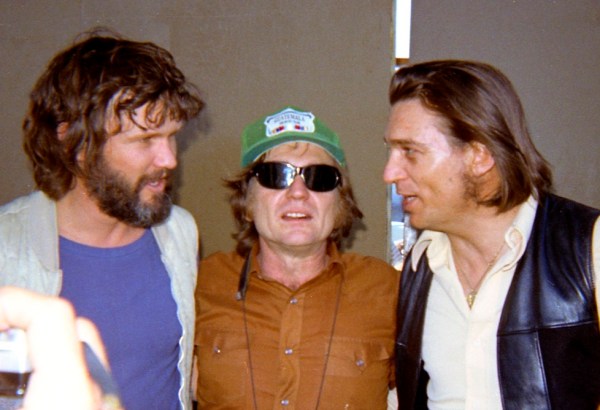
Kris Kristofferson, left, Willie Nelson, center, Waylon Jennings, right
Something's Going Down at the Armadillo World Headquarters
Around the time Willie Nelson left his burned down home in Nashville for Austin, a funky little club called the Armadillo World Headquarters opened its doors in 1970. For 10 years, the Armadillo hosted Austin's iconically weird scene like a potpourri of funky country rock.
Nelson and Jennings quickly found a home in the club, not just with their offbeat brand of country, but with the seemingly endless trove of future legends playing the stage. From Asleep at the Wheel to ZZ Top to Ray Charles to Frank Zappa to Bruce Springsteen.
It's like every rock concert Nelson and Jennings saw, their hair grew a centimeter longer. The polished, clean sound of Nashville had no place in the dingy, drug-induced world of the Armadillo. Though Jennings initially held some reservations about playing the Armadillo, Nelson convinced him. And when the crowd embraced him, there was no turning back for Jennings.
For the next several years, Jennings and Nelson independently grew their sound across the country. They toured hard. Jennings fell in love with an artist named Jessi Colter, who eventually inspired him to write "Good Hearted Woman" (she penned a few stunners using Waylon as a muse as well).
Eventually rising from his broke, sick and addicted past, Jennings eventually commanded crowds of more than 100,000. And Nashville was watching.
Nashville Comes Calling
All of a sudden, this guy who couldn't get a dime from his old label had something the suits in Nashville found useful. The head of RCA Nashville, Jerry Bradley, realized Jennings knew what he was doing after all. Bradley also realized that Jennings, Nelson, Colter and Tompall Glaser all recorded plenty of great material while with RCA.
So, he came up with an idea: put it on a compilation album and embrace the "outlaw" image. With Jennings' blessing, Bradley comprised an 11-track record featuring all four artists, including two duets between Nelson and Jennings. The new movement of music was inspired by Waylon Jennings & Willie Nelson, but also by Kris Kristofferson, Billy Joe Shaver, Mickey Newbury, Lee Clayton, David Allan Coe and Townes Van Zandt.
Bradley knew that for the concept to stick, he'd need to really emphasize the "outlaw" image. The first step involved hiring Rolling Stone writer Chet Flippo to write the liner notes and draft this "Wild West" persona. He used old imagery from Time Life books to draft the "wanted poster" look for the album cover, which stands as one of the most iconic to this day.
In its cruelest twist of irony, the "outlaw" country movement, which relied on a "screw you Nashville" attitude, got its biggest boost from the Nashville machine embracing the concept.
An Instant Hit
Released by RCA Records, Wanted! The Outlaws wasted no time becoming an instant classic. Most of the songs came from that early 1970s period, when the seeds of the outlaw movement had just been planted. Jessi Colter's undeniably strong voice lent some much-needed female energy to the concept of general badassery, especially with "I'm Looking For Blue Eyes."
Glaser said the album offered something fresh and listeners ate it up. According to him, it sold a million copies in only two weeks and eventually made it up to five million. It went No. 1 on the country albums chart and, surprisingly, No. 10 on the pop album charts. "Good Hearted Woman" made it to No. 1 and "Suspicious Minds" made it to No. 2. "Put Another Log on the Fire," "My Heroes Have Always Been Cowboys," and "Yesterday's Wine" are additional strong songs. Other tracks on the album include "You Mean to Say," "Me and Paul," "T For Texas," "Nowhere Road," and others.
The record also had the distinction of being one of the first to receive the "CD" adaptation treatment in 1984. This music wasn't necessarily new, but it came packaged in a way that drew the right people towards it. People finally "got it" when they heard it all in one place.
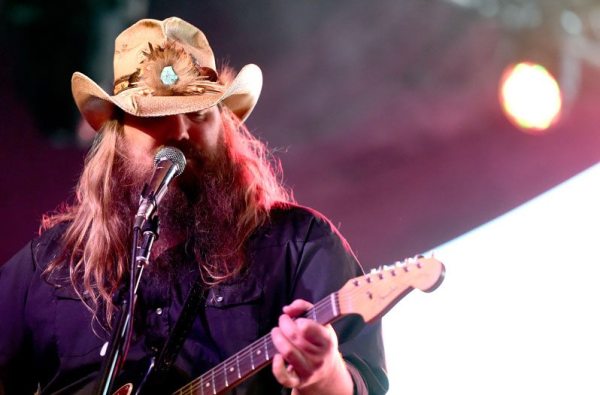
Chris Stapleton carries on the outlaw country tradition. Frazer Harrison/Getty Images
Outlaws Reborn
Interestingly enough, we're seeing a revival of the "outlaw" concept in mainstream country. Wanted! came at a time when pop country was in its second full renaissance (there have been many, many infusions of country and pop). Nowadays, artists like Chris Stapleton, Brothers Osborne and Kacey Musgraves capture that similar sentiment.
These artists get back to the songwriting basics, hitting on hard truths and "controversial" topics ranging from same-sex love to drug use to atheism. Miranda Lambert may be the "Waylon Jennings" of the 2000s, seeing as she continues to push the boundaries both to rockiest and most traditional ends of the country spectrum.
And fans are eating it up. Stapleton continues to rack up awards and stay in the top 10 of album sales. Musgraves sells out venues across the globe. Brothers Osborne just won in a surprise upset at the CMA Awards and already earned a Grammy nomination off their debut album.
All this comes at a time when carefree tailgate country dominated the charts and bro country plagued the blogs. The artistic answer to those commercial wheels came in the form of Jason Isbell, Sturgill Simpson and Margo Price. The concept of "Americana" as a genre may as well be the new "outlaw country," in theory.
Whatever you want to call it, one thing is certain. The spirit behind Wanted! The Outlaws is alive and well in some of today's most promising acts. If you're interested in revisiting the album that changed it all, the 20th anniversary edition has multiple bonus tracks including "Slow Movin' Outlaw," and "I'm a Ramblin' Man," "Under Your Spell Again."
This post was originally published on September 20, 2019.
